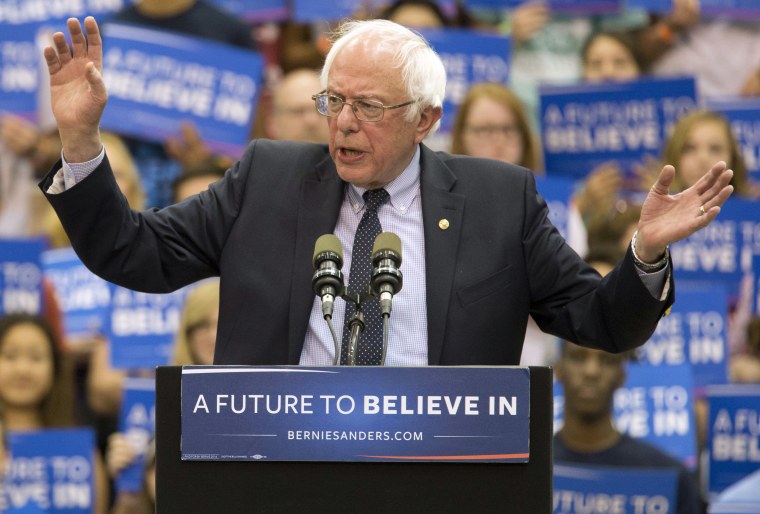PHILADELPHIA — Things will get worse for Bernie Sanders before they get better — if they ever do.
Bruised and battered but soldiering on after last week’s rout in New York, Sanders is bracing for another rough night Tuesday, when Democratic presidential front-runner Hillary Clinton is favored to win most or all of the five states that hold Democratic primaries in the Northeast.
At stake are 384 pledged delegates, nearly twice as many as the 247 in New York during the last primary race. Ahead of a relatively quiet May, Tuesday will be last major allocation of delegates until June 7, when California and six other states hold contests on what is nearly the last day of campaigning in the Democratic primary.
“If you come out to vote tomorrow and drag your friends and your aunts and your uncles and your co-workers, we’re going to win here in Pennsylvania,” Sanders told a couple thousand people at an election even rally on the campus of Drexel University here Monday night.
RELATED: Clinton and Sanders each say party unity is the others’ job
Sanders’ strategy was so focused on momentum that it left little to fall back on when momentum was not on Sanders’ side.
Clinton currently leads in most polls in all five states — and by double digits in the two largest, Pennsylvania and Maryland. In Pennsylvania, a new NBC News poll shows Clinton up 15 percentage points.
Four of the five races Tuesday are closed primaries, which allow only registered Democrats to participate. Sanders performs best with independent voters and has lost every single closed primary this year, including in the Empire State, where supporters blamed the tight rules for Sanders’ loss.
The Vermont senator enjoys his best prospects in Rhode Island, thanks to its open primary and 85 percent white electorate, a demographic that generally plays well for Sanders. But even there, where he held a large rally Sunday, what little polling does exist paints a mixed picture.
Of course, polls also showed Clinton 20 percentage points ahead in Michigan, even though she ended up losing in a major upset last month. Sanders is hoping for a repeat, though polls have been right more often than they’ve been wrong this year.
“I am thrilled to be here in Philadelphia with all of you,” Clinton said Monday night in the courtyard of the Philadelphia’s iconic city hall. “And I am delighted to be in this beautiful setting on this spring evening, because it makes us all feel like there will be a new beginning, doesn’t it?”
“If you vote for me tomorrow, I will stand up and fight for you and for our future through this campaign and into the White House. Let’s go seize the future together,” she said.
Pennsylvania has always been good to the Clintons, giving both her and her husband crucial wins in 1992, 1996, and 2008 in both primaries are generals. Eight years ago, it was the state that kept Hillary Clinton in the Democratic primary after a string of losses to Barack Obama, when the Keystone Stated delivered her a 10-point victory.
RELATED: Poll: Clinton builds on lead over Sanders nationally
And it was here in 2014 when Clinton found the first inklings of what would become the message of her second presidential bid while she stumped for the current governor, Tom Wolf.
Delaware, Connecticut and Rhode Island, which are all voting, are three of the smallest states in the union, so they offer few delegates unless they’re won by a wide margin.
The largest prizes Tuesday are Pennsylvania and Maryland. As with all Democratic contests, delegates are awarded proportionally, so margins are almost as important as who wins or loses.
Sanders strategists hoped to gain traction in Pennsylvania and win there, but the polls never tightened nearly enough. His team always viewed Maryland as out of reach, given that it has the largest portion of black voters in any state outside the deep South. That voting bloc has favored Clinton overall in the 2016 race.
Sanders could end Tuesday night trailing Clinton by more than 300 pledged delegates, or close to triple the deficit Clinton had during her worst moments in 2008. But Sanders has made it abundantly clear he has no plans to go anywhere.
“At every event, with crowds as large and excited as at any point in this campaign, people are telling Bernie to fight,” his campaign manager, Jeff Weaver, wrote in a fundraising email to supporters. “To fight for every last delegate, and for every last vote — not just because they’re needed to win, but because each one sends an unmistakable message about our country’s need for transformational change.”
A set of losses Tuesday would make California all the more important in Sanders’ strategy, as the final, last-ditch, Hail Mary shot at winning. With it’s 475 delegates, it’s mathematically possible for Sanders to finish the race with more pledged delegates than Clinton — but he would need an impossibly large margin in the state.
Still, with a Federal Election Commission fundraising deadline looming just five days away, Sanders will need some silver lining from Tuesday’s races to take home to his supporters.

